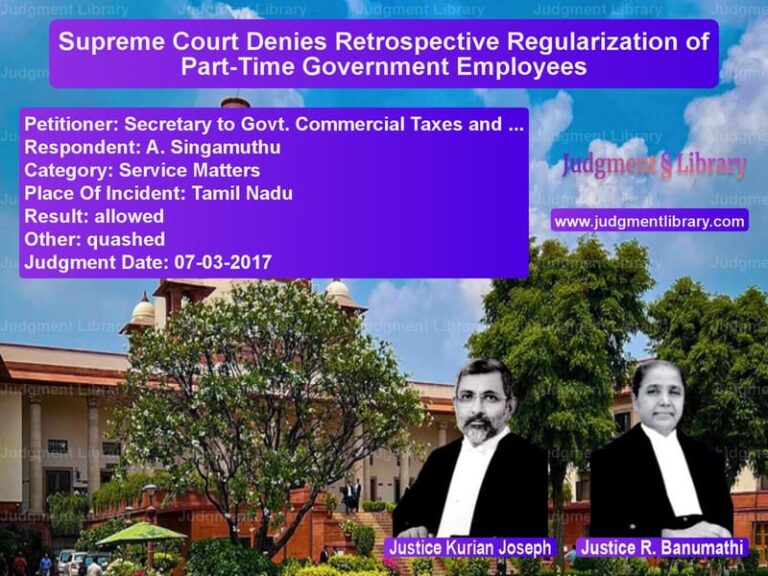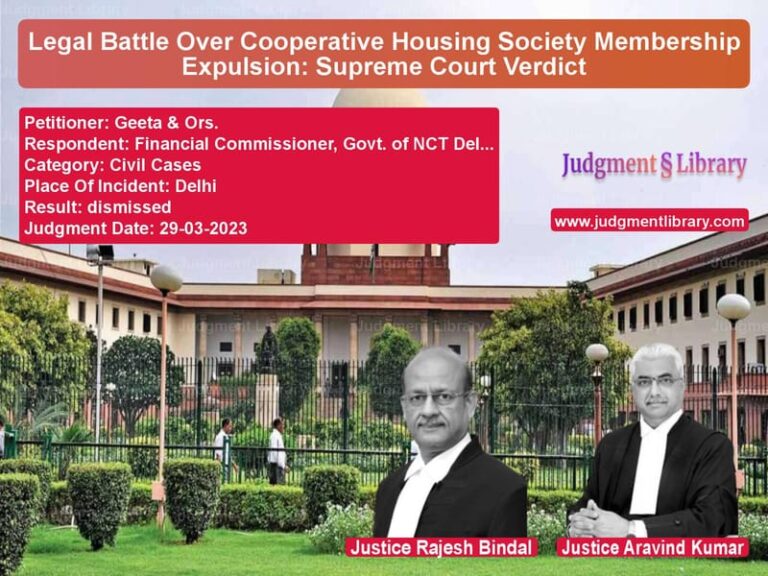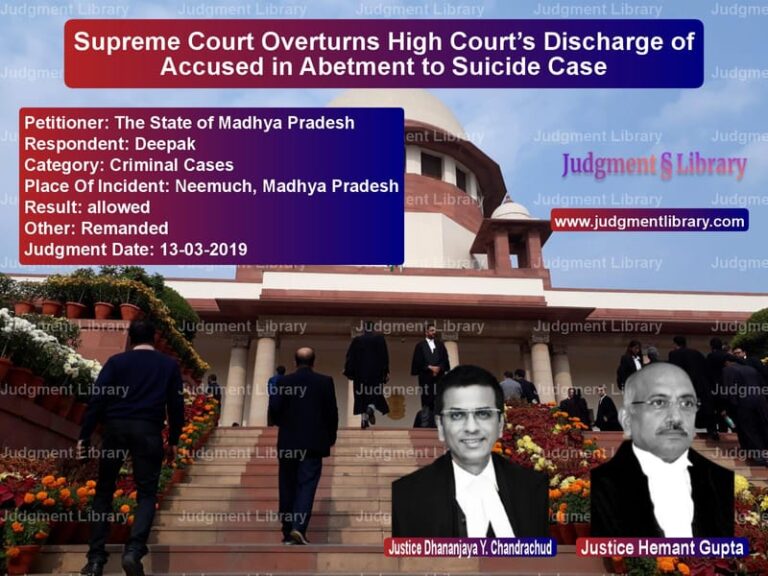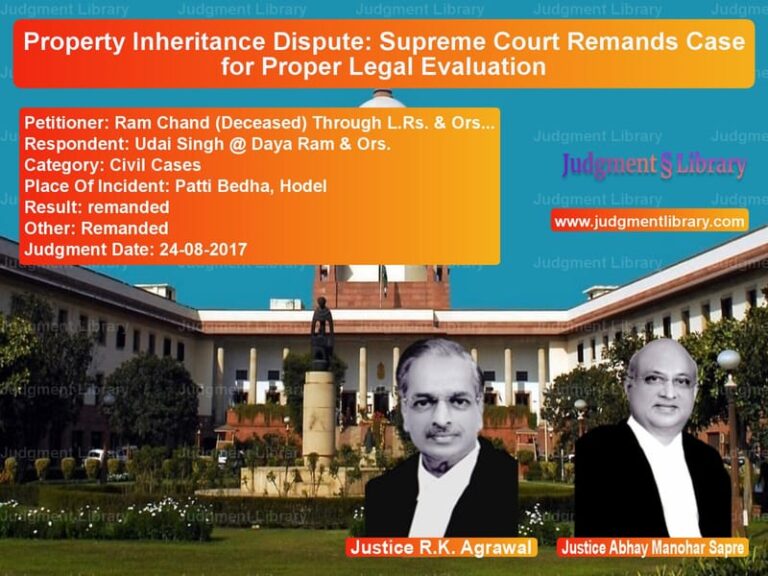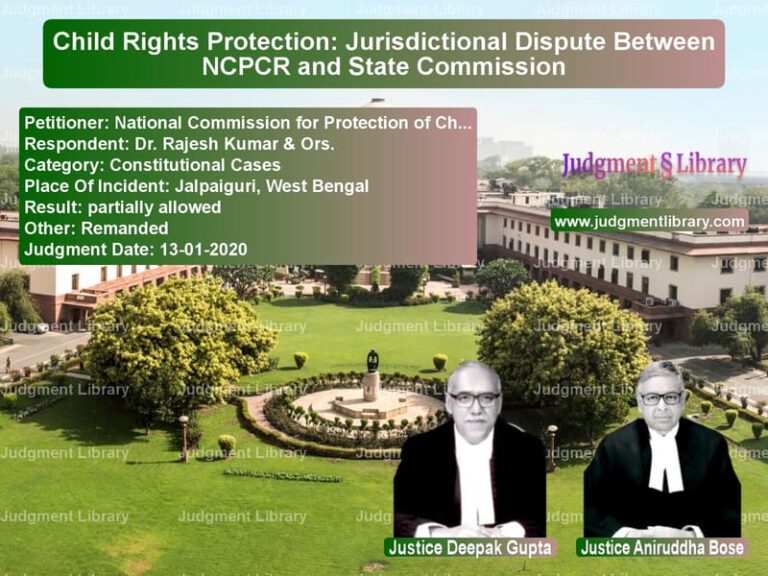NDPS Act Bail Case: Supreme Court Cancels Bail of Accused in Drug Trafficking Case
The case of Union of India through Narcotics Control Bureau v. Md. Nawaz Khan revolves around a major drug trafficking case under the Narcotic Drugs and Psychotropic Substances Act, 1985 (NDPS Act). The Supreme Court was called upon to determine whether the High Court erred in granting bail to the accused, despite the presence of a large quantity of contraband and strong evidence linking him to the crime. Ultimately, the Supreme Court quashed the bail order and directed the accused to surrender immediately.
Background of the Case
The case originated from a drug seizure operation conducted by the Narcotics Control Bureau (NCB), Lucknow. The key events are as follows:
- On March 26, 2019, the NCB received information that three individuals from Manipur—Md. Arif Khan, Rafiuddin, and Md. Nawaz Khan (respondent)—were transporting a large quantity of heroin/morphine from Dimapur (Nagaland) to Rampur (Uttar Pradesh).
- The suspects were traveling in a Maruti Ritz car (UK 06 AA 2582), which was intercepted near Babu Banarasi Das College, Lucknow.
- A thorough search of the vehicle revealed 3.3 kg of morphine hidden under the car’s wiper assembly.
- The NCB arrested all three accused and recorded their statements under Section 67 of the NDPS Act.
- Laboratory tests confirmed the seized substance as morphine, a banned narcotic under the NDPS Act.
- The respondent, Md. Nawaz Khan, applied for bail, which was initially rejected by the Seventh Additional District and Sessions Judge, Lucknow, citing the large quantity of contraband.
- He then approached the High Court of Allahabad (Lucknow Bench), which granted him bail on October 1, 2020.
- Aggrieved by the bail order, the NCB challenged it before the Supreme Court.
Key Legal Issues
The Supreme Court had to address the following questions:
- Was the accused in conscious possession of the contraband?
- Did the High Court apply the correct legal standard under Section 37 of the NDPS Act while granting bail?
- Was there procedural compliance with Sections 42 and 50 of the NDPS Act?
- Should the accused be required to surrender given his non-compliance with court proceedings?
Arguments by the Petitioner (NCB)
The Additional Solicitor General (ASG), representing the NCB, argued:
- The accused was traveling in the car from Dimapur to Rampur and was closely associated with the other co-accused.
- Call Detail Records (CDRs) showed that the accused was in constant communication with known drug traffickers.
- The High Court failed to consider Section 37(1)(b)(ii) of the NDPS Act, which mandates that bail should not be granted unless there are reasonable grounds to believe the accused is innocent.
- The large quantity of contraband (3.3 kg morphine) fell under the commercial quantity category, invoking stricter bail conditions.
- The accused had absconded after securing bail, leading to a non-bailable warrant.
Arguments by the Respondent (Md. Nawaz Khan)
The defense, represented by Advocate Rakesh Dahiya, countered:
- The respondent was merely a passenger and had no knowledge of the drugs hidden in the car.
- No drugs were recovered from his personal possession.
- The police did not properly comply with Sections 42 and 50 of the NDPS Act, which deal with search and seizure protocols.
- The High Court correctly applied the law and granted bail.
Supreme Court’s Observations
The Supreme Court made the following key observations:
- The accused traveled the entire route with the co-accused, indicating a level of conscious possession.
- “When large quantities of narcotics are found in a private vehicle, all occupants must explain their presence. Mere denial is insufficient.”
- The High Court did not apply the stringent bail conditions required under Section 37 of the NDPS Act.
- CDR analysis confirmed regular communication between the accused and a known drug trafficker.
- Section 42 compliance (recording information before search) was prima facie met, and any challenge must be addressed during trial.
- The accused’s failure to appear after securing bail showed disregard for legal proceedings.
Supreme Court’s Judgment
The Supreme Court ruled in favor of the NCB and:
- Set aside the High Court’s bail order.
- Directed the accused to surrender immediately.
- Clarified that bail cannot be granted for NDPS Act cases unless strict conditions under Section 37(1)(b)(ii) are satisfied.
Key Takeaways from the Judgment
- Stricter Bail Conditions for Drug Offenses: Courts must ensure compliance with Section 37 of the NDPS Act before granting bail.
- Conscious Possession Matters: When drugs are found in a vehicle, all occupants must explain their presence.
- Call Records Strengthen Prosecution: CDR analysis linking an accused to known traffickers is a strong piece of evidence.
- Absconding Accused Loses Bail Rights: An accused who evades court proceedings after securing bail may have it revoked.
- NDPS Cases Need Strict Scrutiny: Courts should not grant bail in narcotics cases unless there is substantial evidence of innocence.
Conclusion
The Supreme Court’s ruling in Union of India v. Md. Nawaz Khan reinforces the stringent requirements for bail under the NDPS Act. The judgment clarifies that in drug trafficking cases, courts must strictly scrutinize the accused’s involvement before granting bail. This ruling ensures that the law effectively deters large-scale drug trafficking and prevents accused persons from misusing the bail system.
Petitioner Name: Union of India through Narcotics Control Bureau.Respondent Name: Md. Nawaz Khan.Judgment By: Justice Dhananjaya Y Chandrachud, Justice B.V. Nagarathna.Place Of Incident: Lucknow, Uttar Pradesh.Judgment Date: 21-09-2021.
Don’t miss out on the full details! Download the complete judgment in PDF format below and gain valuable insights instantly!
Download Judgment: union-of-india-throu-vs-md.-nawaz-khan-supreme-court-of-india-judgment-dated-21-09-2021.pdf
Directly Download Judgment: Directly download this Judgment
See all petitions in Drug Possession Cases
See all petitions in Bail and Anticipatory Bail
See all petitions in Judgment by Dhananjaya Y Chandrachud
See all petitions in Judgment by B.V. Nagarathna
See all petitions in allowed
See all petitions in Quashed
See all petitions in supreme court of India judgments September 2021
See all petitions in 2021 judgments
See all posts in Criminal Cases Category
See all allowed petitions in Criminal Cases Category
See all Dismissed petitions in Criminal Cases Category
See all partially allowed petitions in Criminal Cases Category


